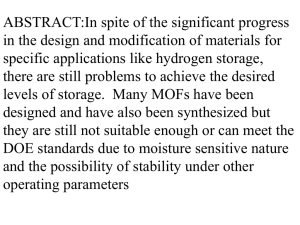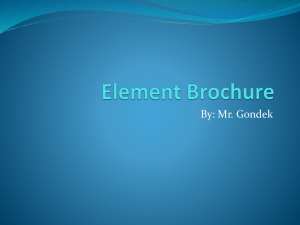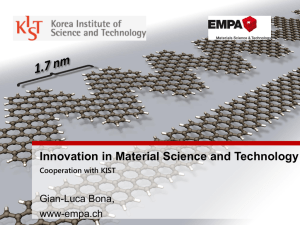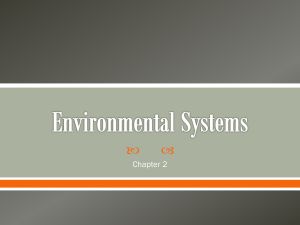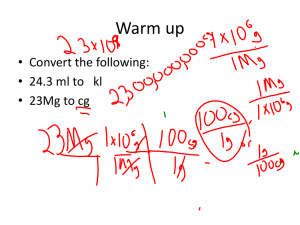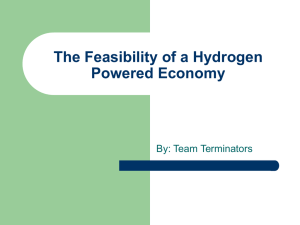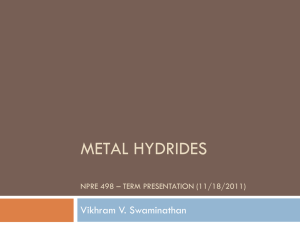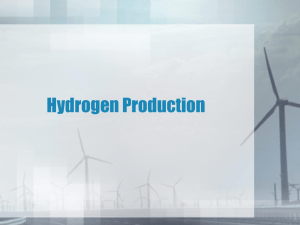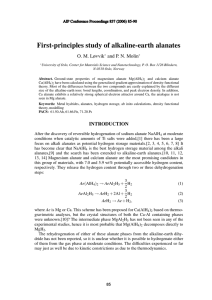MS PowerPoint
advertisement
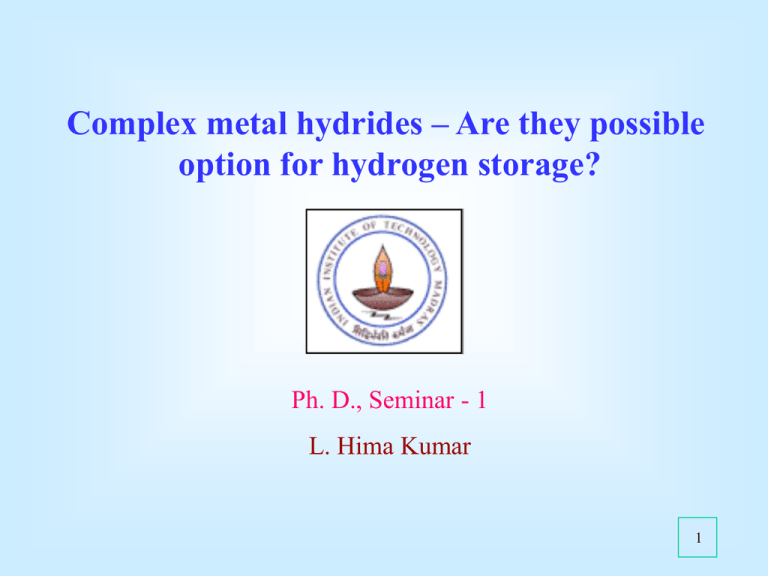
Complex metal hydrides – Are they possible option for hydrogen storage? Ph. D., Seminar - 1 L. Hima Kumar 1 Contents Need for alternative fuel Hydrogen as an alternative Hydrogen Storage Complex metal hydrides Conclusions 2 Why alternative fuel ? Growing demand Depletion in fossil fuels Environmental concerns Awareness for equidistribution Economy and processibility S. Dunn, Tech Monitor, Nov-Dec (2001) 14 3 Hydrogen as an energy carrier C (coal) → -CH2- (oil) → CH4 (natural gas) → H2 (hydrogen) High energy per unit mass Most abundant Renewable sources Eco-friendly M. Conte, A. Jacobazi, M. Ronchetti and R. Vellone, J. Power Sources, 100 (2001) 171 4 Comparison of fuel properties Hydrogen H2 Methane CH4 Gasoline -(CH2)n- kWh kg-1 33.33 13.9 12.4 Self ignition temperature K 858 813 498-774 Flame temperature K 2318 2148 2473 Ignition limits in air vol% 4 - 75 5.3 - 15 1.0-7.6 Min. ignition energy mW 0.02 0.29 0.24 Flame propagation in air m s-1 0.02 0.4 0.4 kg TNT m-3 2.02 7.03 44.22 cm2 s-1 0.61 0.16 0.05 No No High Properties Lower heating value Explosion energy Diffusion coefficient in air Toxicity Unit 5 Various ways of production of hydrogen Reforming, partial oxidation Electrolysis of water Thermochemical dissociation of water Photochemical, Photobiological process 6 What options are available for hydrogen storage ? High pressure gas cylinders Liquid hydrogen in cryogenic tanks Porous materials Carbon nanomaterials Metal hydrides Complex metal hydrides 7 Conventional methods High pressure gas cylinders Pressure 20 – 80 MPa The volumetric density increases with increasing the pressure Low gravimetric density Unsafe Liquid hydrogen Cryogenic tanks Temp: 21 K Pressure: ambient Density: 70.8 kg m-3 Boil-off losses Energy necessary for liquefaction is high 8 Solid-state hydrogen storage Criteria for a hydrogen storage medium Appropriate thermodynamics Fast kinetics (quick uptake and release) High storage capacity Effective heat transfer High gravimetric and volumetric densities Long cycle life time for hydrogen absorption/desorption High mechanical strength and durability Safety under normal use 9 Hydrogen storage capacity : Target ? (6.5 wt%) DoE : Department of Energy 10 Porous materials Zeolites Mesoporous silica Metal-organic Glass microspheres framework N. L. Rosi, J. Eckert, M. Eddaoudi, David T. Vodak, J. Kim, Michael O’Keeffe and Omar M. Yaghi, Science, 300 (2003) 1127 11 Boron nitride nanotubes Carbon nanostructures Graphite nanofibers Carbon nanotubes (SWNT, MWNT) Fullerenes 12 Some of reported results achieved for hydrogen storage in carbon nanostructures Carbon nano structures Pressure (MPa) Temp. (K) Wt% of hydrogen Graphitic nano fibers 12 300 10-67 SWNT 0.04 133 5-10 SWNT(50 % purity) 10.01 300 4.2 MWNT Ambient 300-700 0.25 Li-CNT 0.1 473-673 20 0.75-4.2 K-CNT 0.1 313 14 SWNT-Fe 0.08 Ambient 0.005 SWNT-TiAl0.1V0.04 0.067 Ambient 1.47 MWNT-NiO-MgO 600 Ambient 0.65 Reversible amount of hydrogen vs. B.E.T. surface area Specific surface area (m2/g) Li Zhou, Renewable and Sustainable Energy Reviews (in press) 13 Metal hydrides M + (x/2)H2 MHx Ionic, covalent and metallic Non-transition metals – ionic, covalent Transition metals – metallic Metal hydrides have high volumetric storage densities. The storage density is higher than liquid or solid hydrogen. Interaction of hydrogen with metal in metallic hydrides is absorption process 14 Schematic representation of hydrogen storage in Metal hydrides Interaction of hydrogen with metal Distance from the metal [Å] Potential energy of hydrogen approaching a metallic surface Under hydrogen pressure metals absorb hydrogen By reducing the pressure and supplying heat, hydrogen is released H2 molecule is first adsorbed on the surface and then dissociated as strongly bound individual H atoms 15 Pressure-Composition isotherms for hydrogen absorption in a typical intermetallic compound H/M 1000/T [K-1] H/M H S ln p RT R L. Schlapbach and A. Züttel, Nature, 414 (2001) 23 16 Which hydrides for hydrogen storage? Metal hydrides Interametallic compound hydrides Complex metal hydrides Metal hydrides - MgH2, BeH2, TiH2 High storage capacity Poor kinetics High temperature & pressure 17 Intermetallic hydrides Important families of hydride-forming intermetallic compounds IMC Prototype Hydride AB5 LaNi5 LaNi5H6 AB2 ZrV2, TiMn2 ZrV2H5.5 AB3 CeNi3,YFe3 CeNi3H4 A2B7 Y2Ni7, Th2Fe7 Y2Ni7H3 A6B23 Y6Fe23 Y6Fe23H12 AB TiFe, ZrNi TiFeH2 A2B Mg2Ni,Ti2Ni Mg2NiH4 A – hydrogen absorber (rare earth or alkaline earth metal) B – hydrogen activator (transition metal ) 18 Conventional methods Porous materials Carbon nanotubes Intermetallics Storage Capacity < 3 wt% 19 Complex metal hydrides General formula - Ay[MHx]z Alanates Borohydrides 20 What are alanates? - Complex metal hydrides containing AlH4General formula M(AlH4)n NaAlH4 LiAlH4 Mg(AlH4)2 Ca(AlH4)2 KAlH4 Ti(AlH4)4 Hydrogen atoms arranged tetrahedrally around Al Hydrogens retain significant hydride or electron-rich character 21 Synthesis 4 LiH + AlCl3 ether LiAlH4 + 3 LiCl NaAlH4 , Ca(AlH4)2 and Mg(AlH4)2 Direct synthesis Na + Al + 2 H2 NaAlH4 (545 K, 175 bar ) Mechanochemical synthesis MH + AlH3 MAlH4 Ball to powder weight ratio 20:1 A. E. Finholt, A. C. Bond Jr. and H. J. Schlesinger, J. Am. Chem. Soc. 69 (1947) 1199 22 Calculated hydrogen storage capacity Hydride LiAlH4 H2 Content (wt%) 10.5 NaAlH4 KAlH4 Be(AlH4)2 7.5 5.7 11.3 Mg(AlH4)2 Ca(AlH4)2 Ti(AlH4)4 9.3 7.7 9.3 LiBH4 NaBH4 18.0 10.4 Al(BH4)3 17.0 23 Decomposition Reaction Two step process NaAlH4 1/3 Na3AlH6 + 2/3 Al + H2 Na3AlH6 3 NaH + Al + 3/2 H2 H/M Reversibility NaAlH4 + Ti(OBu)4 Ti doped NaAlH4 NaAlH4 + TiCl3 Ti doped NaAlH4 H/M B. Bogdanovic and M. Schwickardi, J. Alloys Comp. 257 (1997) 1 24 Thermodynamics 3 NaAlH4 Na3AlH6 Na3AlH6 + 2 Al + 3 H 2 (3.7 wt%) ; H = +37 kJ/mol 3 NaH +Al + 3/2 H 2 (1.9 wt%) ; H = +47 kJ/mol T (ºC) 1000/T [K-1] NaAlH4 is a low temperature hydride Na3AlH6 is the medium temperature hydride B. Bogdanovic, Richard A. Brand, A. Marjanovic, M. Schwickardi and J. Tölle, J. Alloys Comp. 330-332 (2002) 683 25 Doping of alanates - wet chemical method - dry method Advantages Reversibility Reversible content of doped alanate = 3.1 - 4.2 wt% undoped alanate = 0.5 – 0.8 wt% Improved H2 desorption rate Higher cycle stability Reduction in dehydriding temperature by 323 K Difficulties Use of alkoxides contaminates desorbed H2 Weight penalty Oxygen from decomposition of alkoxide contaminates active material K. J. Gross, G. J. Thomas and C. M. Jensen, J. Alloys Comp. 330-332 26 (2002) 683 Kinetics of alanates Factors affecting the reaction rates Particle size Catalyst type method of doping amount 27 Dehydrogenation rates for various transition metal catalysts Rate = k exp(-Q/RT ) Q activation energy Catalyst additions and resultant dehydrogenation rates D. L. Anton, J. Alloys Comp. 356-357 (2003) 400 28 Effect of method of doping Temperature (°C) Milling time (hr) Effect of milling time on dehydrogenation rate Doped with Ti(OBu)4 C. M. Jensen, R. Zidan, N. Mariels, A. Hee and C. Hagen, Int. J. Hydrogen Energy, 24 (1999) 461 29 Doping with TiCl4 TiCl4 + 4 NaAlH4 Ti + 4 NaCl + 4 Al + 8 H2 Doping with Ti Ball milling of elemental Ti and NaAlH4 Kinetics better than ball milling alone Rehydrides at 393 K and 55 bar Poor kinetics for subsequent dehydriding Doping with Carbon Kinetics improved over other dopants Rate increases with subsequent cycles Rehydrogenation occurs under practical conditions 30 Effect of Catalyst Loading TiCl3 level (mol%) TiCl3 level (mol%) TiCl3 level (mol%) 31 Mechanism a (Å) NaAlH4 Ti+4 - 0.67 Å Ti+3 – 0.76 Å Ti+2 – 0.82 Å a (Å) Concentration (mol%) Schematic illustration of the changes in NaAlH4 lattice upon increased level of doping D. Sun, T. Kiyobayashi, H. T. Takeshita, N. Kuriyama and C. M. Jensen, J. Alloys Comp. 337 (2002) L8 32 Two Theta [˚] 3 (NaH)(AlH3) AlH3 (NaH)3 (AlH3) + 2 (AlH3) (catalyst) 3 (NaH) + 3 (AlH3) Al + 3/2 H2 Catalyst remains on the surface of the NaAlH4 crystal surface Phase transformations occur by the long-range diffusion of metal species through the alanate crystal structure to the catalyst on the surface Catalyst would work on the surface of the crystal as a dissociation-recombination site K. J. Gross, G. Sandorck and C. M. Jensen, J. Alloys Comp. 330-332 (2002) 691 33 Highlights Slow de/rehydriding kinetics remain a significant barrier Destabilizing the second desorption step is necessary to achieve the full theoretical capacity of hydrogen available Long-term cycling studies are required Safety Complete understanding of the reaction mechanism is still unknown Thermodynamic tailoring of alanates Extension to other complex metal hydride 34 Alkaline earth metal alanates - Mg(AlH4)2, Ca(AlH4)2 Synthesis MCl2 + Li/NaAlH4 Catalyst M(AlH4)2 + 2 Li/NaCl Decomposition M(AlH4)2 Catalyst MH2 + Al + 3 H2 Reversibility ? M. Fichtner, J. Engel, O. Fuhr, O. Kircher and O. Rubner, Mat. Sci. & Eng. B 108 (2004) 42 35 Borohydrides Compound with highest gravimetric hydrogen density known today is LiBH4 (18 wt%) Decomposition is similar to that of alanates 2 NaBH4 Δ 2 NaH + B + 3 H2 Reversible conditions 963 K and 200 bar Pyrolysis - high temp, high pressure Other possibility ? 36 Hydrogen storage by NaBH4 Hydrogen generation by the hydrolysis of alkaline sodium borohydride solution Reaction: BH4 -+ 2 H2O catalyst BO2- + 4 H2 Catalysts: Pt, Ru, Ni, Co NaBO2 + 2 MgH2 → NaBH4 + 2 MgO S. C. Amendola, S. L. Sharp-Goldman, M.S. Januja, N.C. Spencer, M. T. Kelly, P. J. Petillo and M. Binder, Int. J. Hydrogen Energy, 29 ( 2004) 263 37 Advantages of NaBH4 NaBH4 solutions are non-flammable NaBH4 solutions are stable in air for months H2 generation occurs only in the presence of selected catalysts Reaction products are environmentally safe H2 generation rates are easily controlled Volumetric and gravimetric H2 storage efficiencies are high Reaction products can be recycled 38 Volumetric and gravimetric hydrogen density of some selected hydrides Gravimetric density [mass%] 39 Conclusions 1. The critical components in hydrogen economy hydrogen production, hydrogen storage and distribution still need technological development. 2. Today’s hydrogen storage technologies do not meet the vehicle requirements. 3. New materials and/or new technical approaches are required to meet hydrogen storage targets for vehicular applications. 4. The possibility of complex metal hydrides as storage media seems to be promising. 40 41 References: 1. Seth Dunn, Tech Monitor, Nov-Dec (2001) 14 2. Li Zhou, Renewable and Sustainable Energy Reviews (in press) 3. Louis Schlapbach and Andreas Züttel, Nature, 414 (2001) 23 4. A. E. Finholt, A. C. Bond Jr. and H. J. Schlesinger, J. Am. Chem. Soc. 69 (1947) 1199 6. B. Bogdanovic, M. Schwickardi, J. Alloys Comp. 257 (1997) 1 7. K. J. Gross,G. J. Thomas and C. M. Jensen, J. Alloys Comp. 330-332 (2002) 683 6. D. L. Anton, J. Alloys Comp. 356-357 (2003) 400 7. C. M. Jensen, R. A. Zidan, N. Mariels, A.G. Hee and C. Hagen, Int. J. Hydrogen Energy 24 (1999) 461 10. D. Sun, T. Kiyobayashi, H. T. Takeshita, N. Kuriyama and C. M. Jensen, J. Alloys Comp. 337 (2002) L8 11. M. Fichtner, J. Engel, O. Fuhr, O. Kircher and O. Rubner, Mat. Sci. & Eng. 42 B 108 (2004) 42
